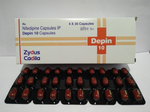nifidip
Introduction to Nifidip
Nifidip is a widely used medication known for its efficacy in managing certain cardiovascular conditions. It primarily contains the active ingredient Nifedipine, which belongs to a class of drugs called calcium channel blockers. These medications work by relaxing the blood vessels, making it easier for the heart to pump blood and reducing its workload. Nifidip is primarily prescribed for conditions such as high blood pressure and angina. It's available in various forms, including tablets, capsules, and in some cases, as an injection, providing flexibility in administration based on patient needs.
Composition of Nifidip
The primary active ingredient in Nifidip is Nifedipine, which is present in a 10mg dosage per unit. Nifedipine plays a crucial role in the effectiveness of Nifidip by acting as a calcium channel blocker. It inhibits the influx of calcium ions into cardiac and smooth muscle cells, leading to vasodilation. This action helps lower blood pressure and alleviates symptoms of angina by improving blood flow to the heart muscle, thereby reducing the heart's oxygen demand. The precise formulation of Nifidip ensures optimal delivery and absorption of Nifedipine, enhancing its therapeutic benefits.
Uses for Nifidip
- Management of high blood pressure (hypertension)
- Treatment of chronic stable angina
- Relief from variant angina (Prinzmetal's angina)
- Improvement of coronary artery disease symptoms
Side Effects of Nifidip
- Headache
- Dizziness or lightheadedness
- Flushing (warmth, redness, or tingly feeling)
- Swelling in the ankles or feet
- Nausea
- Fatigue
- Shortness of breath
Precautions for Nifidip
Before taking Nifidip, it is important to inform your healthcare provider about any existing medical conditions, especially heart problems, liver disease, or a history of allergic reactions to medications. Pregnant or breastfeeding women should use Nifidip only if clearly needed and prescribed by a doctor. Avoid consuming grapefruit or grapefruit juice while taking Nifidip, as it can increase the drug's levels in your bloodstream, leading to adverse effects. Regular monitoring of blood pressure and heart rate is recommended to ensure the medication's effectiveness and safety.
Specifications of Nifidip
Nifidip is available in the following forms:
- Tablets: Nifedipine 10mg per tablet, typically taken orally with or without food.
- Capsules: Designed for easy swallowing, also containing Nifedipine 10mg.
- Injection: Administered by healthcare professionals in a clinical setting for immediate effect.
Conclusion
Nifidip, with its active ingredient Nifedipine, is an effective medication for managing hypertension and angina. Available in multiple forms, it provides flexibility and convenience for patients. While generally well-tolerated, it is important to be aware of potential side effects and take necessary precautions. Always consult with a healthcare provider before starting or adjusting the dosage of Nifidip to ensure it is safe and appropriate for your specific health needs.
Similar Medicines
Available in 2 variations

Nifidip 10mg Tablet
Nifidip 10mg Tablet
strip of 10 tablets

Nifidip 20mg Tablet
Nifidip 20mg Tablet
strip of 10 tablets
Related Faqs

What is nifedipine used for?
Nifedipine is a medicine used to treat high blood pressure. If you have high blood pressure, taking nifedipine helps to prevent future heart disease, heart attacks and strokes. Nifedipine is also used to prevent chest pain caused by angina. Occasionally, its used to treat Raynauds phenomenon and chilblains.

What does nifedipine do in pregnancy?
Nifedipine is an effective drug to treat severe hypertension in pregnancy and preterm labour. Because it is given in a tablet or capsule by mouth, it is easier to use than intravenous drugs. The described side effects of nifedipine to the pregnant woman and her infant appear minimal.

Can Depin be used in pregnancy and nursing mothers?
It is advised that you should consult your doctor before taking this medicine if you are pregnant, planning to become pregnant or breastfeeding. It should be used only if prescribed by the doctor in case of pregnancy. Studies have shown significant risks to the developing baby and it is given only if the benefits are clearly more than the risks involved.

Do I need to change my diet while taking Nifidip?
Yes, making small changes to your diet can help your medicine work better. You must take a low sodium and low-fat diet, and adhere to the lifestyle changes as advised by your doctor. You should also avoid eating grapefruit (chakotra) or drinking grapefruit juice while taking Nifidip.

Is Nifidip a diuretic?
No, Nifidip is not a diuretic medication. However, some evidence indicates that Nifidip has a partial diuretic property which may result in increased sodium loss through urine. It is a medication which relaxes the blood vessels by directly acting on them. This helps to decrease the blood pressure of the individual. As a result, blood flows more easily and lowers blood pressure, which helps to reduce the strain or pressure on your heart.
Related Posts

1:15
Are Your Hormones Out Of Balance? Signs & Symptoms!

1:15
Why Is There Blood in Your Poop? Causes, Symptoms, and When to See a Doctor!

1:15
How Do You Know If You Have a Vaginal Infection? Warning Signs!

1:15
Top Health Benefits of Cinnamon | How to Use It for Better Health!

1:15
Is Your Blood Pressure Too Low? What Are the Best Remedies to Fix Low Blood Pressure Instantly?
Disclaimer : This information is not a substitute for medical advice. Consult your healthcare provider before making any changes to your treatment . Do not ignore or delay professional medical advice based on anything you have seen or read on Medwiki.
nifidip
Prescription Required
Manufacturer :
Dahlia Pharmaceutical Pvt LtdComposition :
















.svg)
